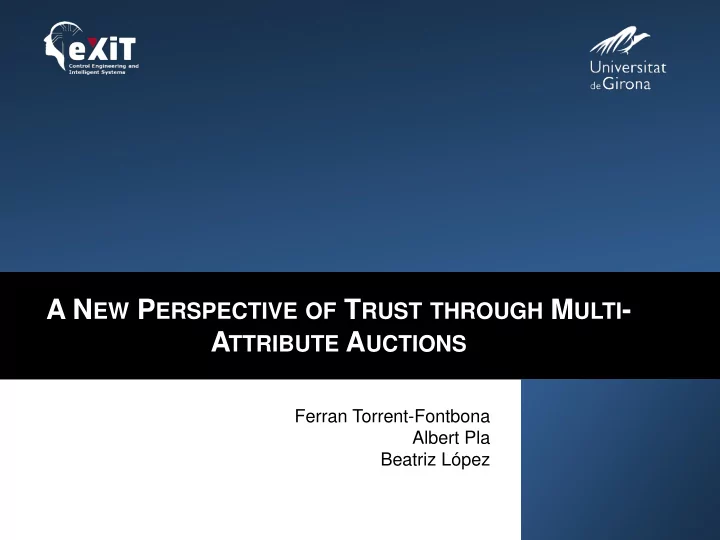

A N EW P ERSPECTIVE OF T RUST THROUGH M ULTI - A TTRIBUTE A UCTIONS Ferran Torrent-Fontbona Albert Pla Beatriz López
Auctions in workflow management systems Auctions allow an optimal allocation for just-in-time Competitive market Special domains: – Production under demand / Supply chain under demand – Handling unexpected tasks (provoked by faults) – Unknown resource status – Outsourced tasks Workflow Agent A Resource Type A AUCTION! Resource Resource Resource ··· Agent n Agent 1 Agent 2 November 13, 2015 2/19
Multi-dimensional allocation problem Production process managers are not only concerned by costs Workflow managers are concerned about multiple attributes: – Economic costs – Product quality – Delivery times – Environmental footprint – Licenses / ISO standardizations – … November 13, 2015 3/19
Multi-dimensional allocation problem Multi-criteria allocation Multi-attribute auctions problem November 13, 2015 4/19
Trust motivation Misdelivered tasks involve: November 13, 2015 5/19
Trust motivation Misdelivered tasks are due: – Cheating behaviors – Involuntary errors • Bidders may not be able to accurately estimate their abilities November 13, 2015 6/19
Trust motivation Cheating agents: – Incentive Compatible Mechanism • Vickrey Based Auction (VCG Payment rule) • … Involuntary errors and misestimating the abilities – Trust & Reputation based auctions • Porter’s auction ( uni-attribute) • Ramchurn’s auction (uni-attribute) • … No solution integrating Incentive compatibility, trust & multi-attribute November 13, 2015 7/19
Multi-attribute resource/task allocation Auctions Uni- Multi- Attribute Attribute Vickrey Position Score Flexible Uncertain Auctions Auctions Auctions Attribute Delivery Auctions Vickrey Che’s Parke’s English 1 attribute + 1 N attributes + GSP VCG Auction PERA n attributes VCG trust attribute Auction Auctions M trust attributes Single Unit First-score Trust Extended- Google PPC De Smet PUMAA Vickrey Auction VCG ∅ Discriminatory Second-Score Porter’s Fault Mahr fair-PUMAA MU Vickrey Auction Tolerant Auction Non- Second-Preferred Trust-Based … Discriminatory Offer Auctions MU Vickrey Suitable for the considered task allocation Use of trust or reputation Not suitable for the considered task allocation Multi-attribute (excluding trust) November 13, 2015 8/19
Methodology 1. Call for proposals (CFP) 2. Bidding 3. Winner determination problem (WDP) 4. Payment 5. Trust learning November 13, 2015 9/19
1. Call for proposals An auctioneer 𝐵 0 needs to allocate a task 𝑈 0 with a set of attributes 𝑏 1 , … , 𝑏 𝑜 It Sends a call for proposals (CFP) to all the bidders – Specifies the task – Specifies the attribute to evaluate – Specifies the evaluation function Bidder Bidder 𝐷𝐺𝑄 1 2 0 , 𝑊 ∙ 0 , … , 𝑏 𝑜 Auctioneer = 𝑈 0 , 𝑏 1 Bidder i November 13, 2015 10/19
2. Bidding Bidders evaluate the CFP and submit the bids with the corresponding attributes 𝐶 𝑗 = 𝑐 𝑗 , 𝑢 𝑗 , 𝑓 𝑗 Each bidder submits the bid that is expected to maximize its utility Bidder Bidder Auctioneer 1 2 Bidder i November 13, 2015 11/19
3. Winner determination problem Inclusion of trust in the valuation of the bid – One trust attribute per checkable attribute = 𝜑 𝑈 0 − 𝑊 𝑐 𝑗 , 𝑢 𝑗 𝑢 , 𝑓 𝑗 𝑢 , 𝜐 𝑗,𝑠 𝑓 𝑣 𝑈 0 , 𝑐 𝑗 , 𝑢 𝑗 , 𝑓 𝑗 , 𝜐 𝑗,𝑠 𝑓 𝜐 𝑗,𝑠 𝜐 𝑗,𝑠 WDP consists of finding the bid that minimizes the evaluation function 𝑊 𝑐 𝑗 , 𝑢 𝑗 𝑢 , 𝑓 𝑗 min 𝑓 𝜐 𝑗,𝑠 𝜐 𝑗,𝑠 𝑗 Bidder Bidder Auctioneer 1 2 Evaluate (Optimize € , kWh, time, trust…) Bidder i Bid 1 Bid 4 Bid 2 … Bid 3 Bid n November 13, 2015 12/19
4. Payment Conditional Vickrey-based payment – Good delivery: VCG playment rule – Bad delivery Payment Bidder Bidder Auctioneer 1 2 Bidder i Item delivery November 13, 2015 13/19
5. Trust learning 𝑢 + 𝛽 𝑢 1 − 𝜐 𝑘,𝑠 𝑓 + 𝛽 𝑢 1 − 𝜐 𝑘,𝑠 𝑢 𝑓 = 𝜐 𝑘,𝑠 if 𝑢′ 𝑗,𝑘,𝑙 ≤ 𝑢 𝑗,𝑘,𝑙 = 𝜐 𝑘,𝑠 if 𝑓′ 𝑗,𝑘,𝑙 ≤ 𝑓 𝑗,𝑘,𝑙 𝑢 𝑓 𝜐 𝑘,𝑠+1 𝜐 𝑘,𝑠+1 𝑓 − 𝛾 𝑢 𝜐 𝑗,𝑠 𝑢 − 𝛾 𝑢 𝜐 𝑗,𝑠 e 𝑢 𝜐 𝑗,𝑠 otherwise 𝜐 𝑗,𝑠 otherwise 𝛽 = 𝛾 = 0.01 November 13, 2015 14/19
Experiments Experiments based on a real business process – One auctioneer outsources tasks to external agents – Consideration of economic cost + delivery time + energy consumption – Greedy bidders – Execution times and energy consumptions based on real agents probability distributions 6 accurate bidders + 6 inaccurate bidders Each accurate bidder has its own inaccurate twin bidder – Same abilities – Same time and energy distributions November 13, 2015 15/19
Results The use of trust highly reduces the amount of bad delivered tasks With agents that always behave equal, Schillo model outperforms the others November 13, 2015 16/19
Results All bidders misestimate the attributes but good bidders add a security margin ( 1.5 × 𝜏 ) November 13, 2015 17/19
Conclusions Merge of trust with multi-attribute auctions Inclusion of trust in the valuation function. This affects: • The winner determination problem • The payment Flexibility of trust regarding each checkable attribute Proposal of a trust learning model Easy to parametrize and adjust the learning curve It does not present rigidity when faces agents’ behavior changes Robust against initialization and random misdeliveries November 13, 2015 18/19
T HANKS !!
Recommend
More recommend